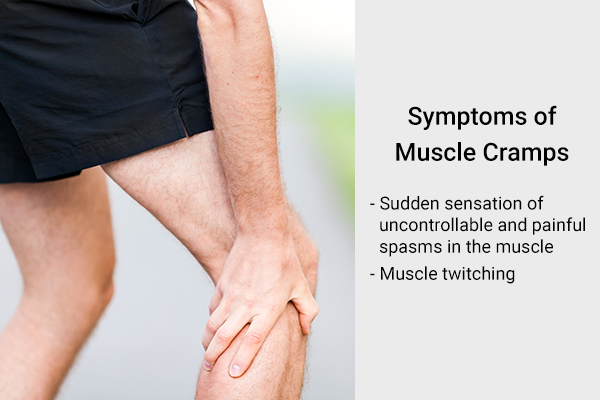In this article:
A muscle cramp is a spontaneous contraction of a muscle that happens unexpectedly and does not relax.

Muscle cramps cause a constant, involuntary, painful, and localized contraction of a complete group of muscles, an individual muscle, or a few muscle fibers.
Commonly, the cramp can prevail from a few seconds to a few minutes due to unknown reasons or known causes such as the presence of diseases. The muscle area of the cramp usually has a knot.
The specific cause of cramps is not well comprehended and likely causes rely on the physiological or pathological condition of the patient. (1)
Causes of Muscle Cramps
Although the precise cause of muscle cramps is unidentified (idiopathic), muscle cramps can be associated with the following.
1. Heat and excessive sweating
Research says anything that increases the excretion of salt such as via sweating raises the risk of cramps. The early investigations of muscle cramping stipulated that sweating can result in muscle cramping. (2)
2. Inadequate stretching
There are data that indicate stretching causes an incredible reduction in the electromyographic activity of the affected muscle. In fact, irregular stretching habits are associated with an elevated risk of cramping. (3)(4)
3. Electrolyte depletion
It is said that intake of salt is a good prevention strategy for cramps. The loss of salt or electrolyte imbalance is definitely responsible for cramps, although the exact mechanism is not known. It can be due to the disruption of physicochemical equilibrium.
Studies have shown that the addition of salt to drinking water was helpful in reducing the rate of cramping. (5)
Symptoms of Muscle Cramps
The symptoms of muscle cramps include:

- Sudden sensation of uncontrollable and painful spasms in the muscle
- Muscle twitching
Risk Factors for Cramping
Researchers have made multiple attempts to characterize the main risk factors predisposing to cramps, and these include: (6)
- High-intensity exercise
- Long duration of running (> 30 km)
- Older age
- High body mass index (BMI)
- Short daily stretching time
- Irregular stretching habits
When to See a Doctor
Muscle cramps usually vanish and resolve on their own and are infrequently serious enough to need medical attention.
Nonetheless, visit your doctor if your cramps cause a lot of discomfort or are associated with swelling, redness, or other symptoms.
Final Word
Muscle cramps are a common complaint of people who exercise a lot. If this discomfort or cramp does not resolve or becomes worse, visit your doctor.
Severe cramps may be an indication of a serious underlying illness that requires medical attention. However, in most cases, the cramps are not serious and go away on their own.
 Continue Reading5 Vitamins and Minerals That Help With Muscle Cramps
Continue Reading5 Vitamins and Minerals That Help With Muscle Cramps
- Was this article helpful?
- YES, THANKS!NOT REALLY


